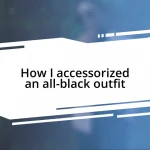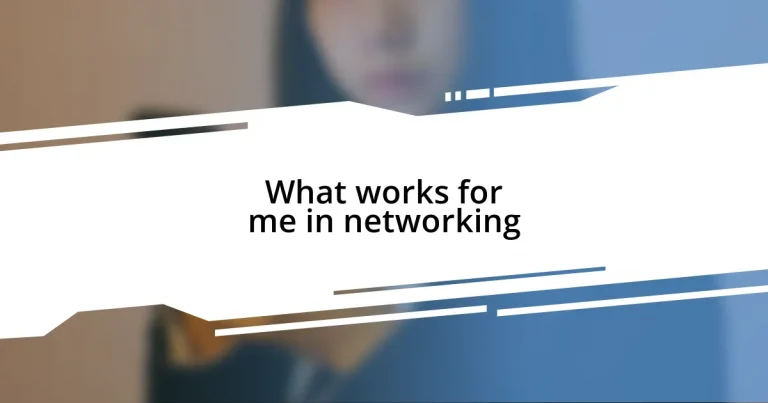Key takeaways:
- Networking is about building genuine relationships through trust and authenticity, rather than simply exchanging contacts.
- Adopting a relational mindset and embracing vulnerability can lead to more meaningful connections and collaborative opportunities.
- Identifying valuable connections involves seeking shared interests, complementary skills, and a positive attitude.
- Effective follow-up is crucial for nurturing relationships, where personal touches can make a lasting impact.
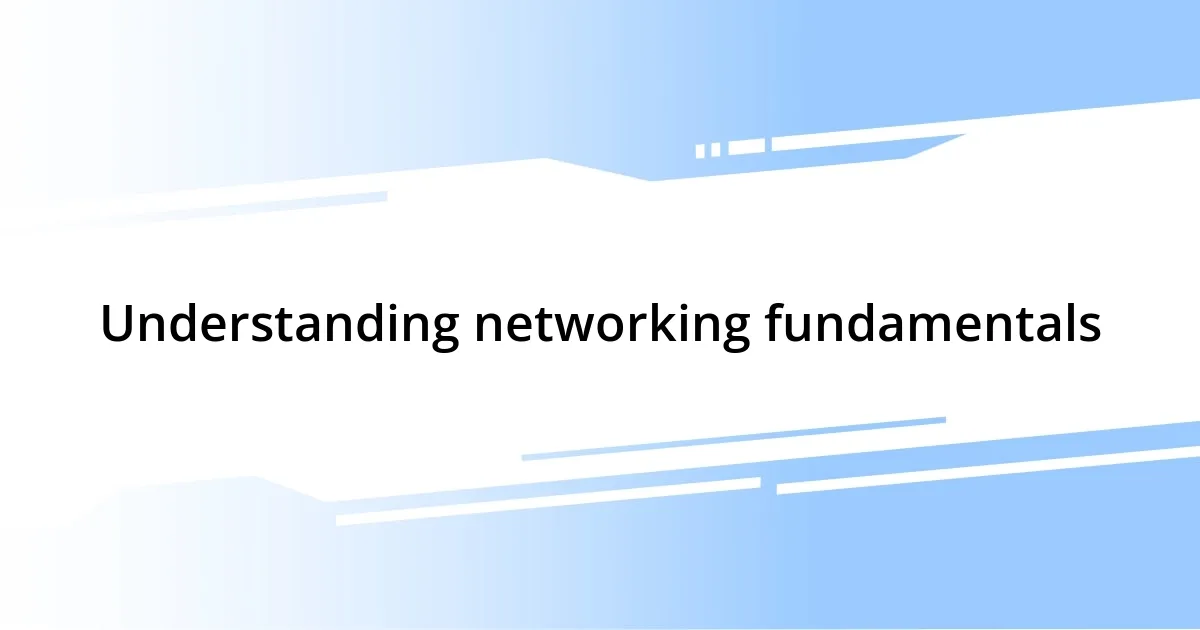
Understanding networking fundamentals
Networking is more than exchanging business cards or LinkedIn connections; it’s about building genuine relationships. I remember my first frantic networking event, where I awkwardly clutched my cards, fearing I’d say something stupid. But the moment I shifted my focus from what I could gain to who I could learn from, everything changed. Have you ever felt that rush of excitement after connecting with someone who truly understands your journey?
At its core, networking thrives on trust and mutual benefit. When I reached out to someone I admired, I was surprised by how willing they were to share insights. This taught me that vulnerability can open doors. Why do we often hesitate to show our true selves when we know it’s the key to meaningful connections? Authenticity creates a safe space for others to engage with you on a deeper level.
Understanding the nuances of networking also means recognizing diverse styles of communication. One of my most valuable lessons came from an introverted friend who prefers small, meaningful conversations over larger gatherings. I realized that effective networking doesn’t have a one-size-fits-all approach. Have you considered how your unique personality shapes your networking experience? Embracing different styles can lead to remarkable opportunities we may not find in conventional settings.
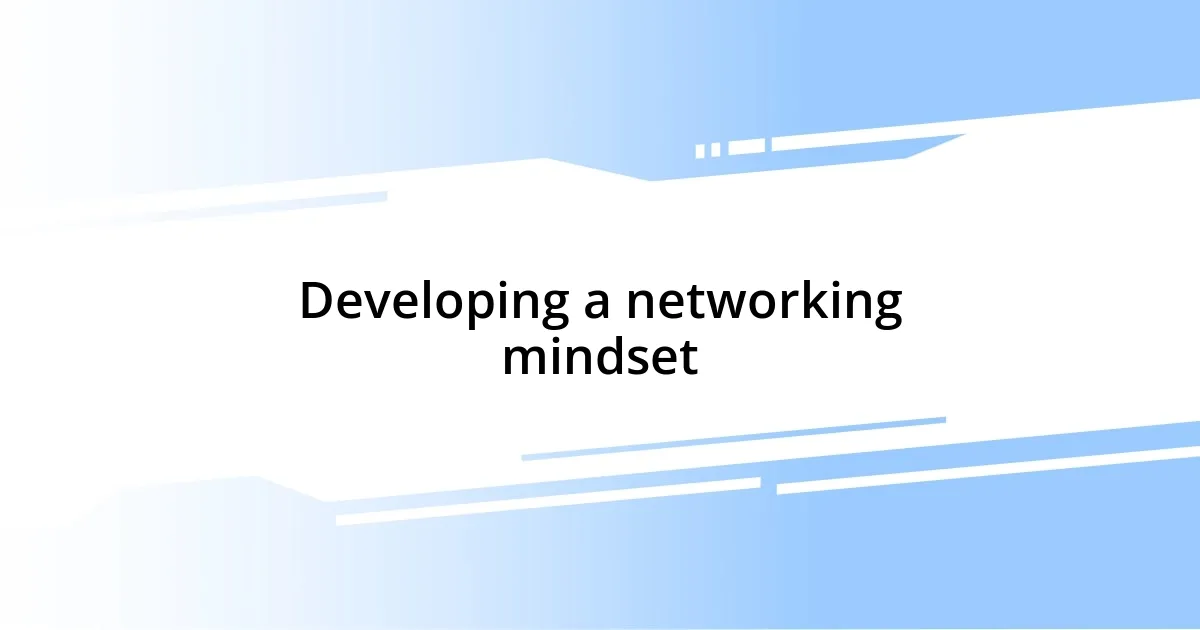
Developing a networking mindset
Developing a networking mindset involves shifting your perspective from transactional thinking to a more relational approach. I vividly recall a time when I attended a conference not just to promote my skills but to seek inspiration from others. The moment I stopped seeing networking as purely self-serving and started viewing it as a chance to learn and share ideas, I felt a wave of relief. It’s a subtle yet powerful transformation that can dramatically enhance your interactions.
I also believe that cultivating a growth mindset is crucial in networking. For instance, I once approached someone at an event who had a wealth of knowledge in my field. Instead of worrying about what I could offer, I asked questions and listened intently. That interaction opened doors to other connections and resources I never knew existed. It left me wondering: What if we all approached networking with curiosity rather than an agenda?
Lastly, embracing vulnerability is key to forming authentic connections. I still remember when I shared my struggles with a mentor during a casual coffee chat. To my surprise, it led to a deeper conversation about overcoming challenges, and we found common ground. Being open about our experiences can create stronger bonds, making networking a more enriching experience. Have you ever considered how sharing your journey might lead to unexpected partnerships?
| Networking Mindset Characteristics | Effects on Connections |
|---|---|
| Relational Focus | Encourages genuine interactions and learning |
| Growth Mindset | Promotes curiosity and exploration of opportunities |
| Vulnerability | Strengthens relationships and fosters trust |
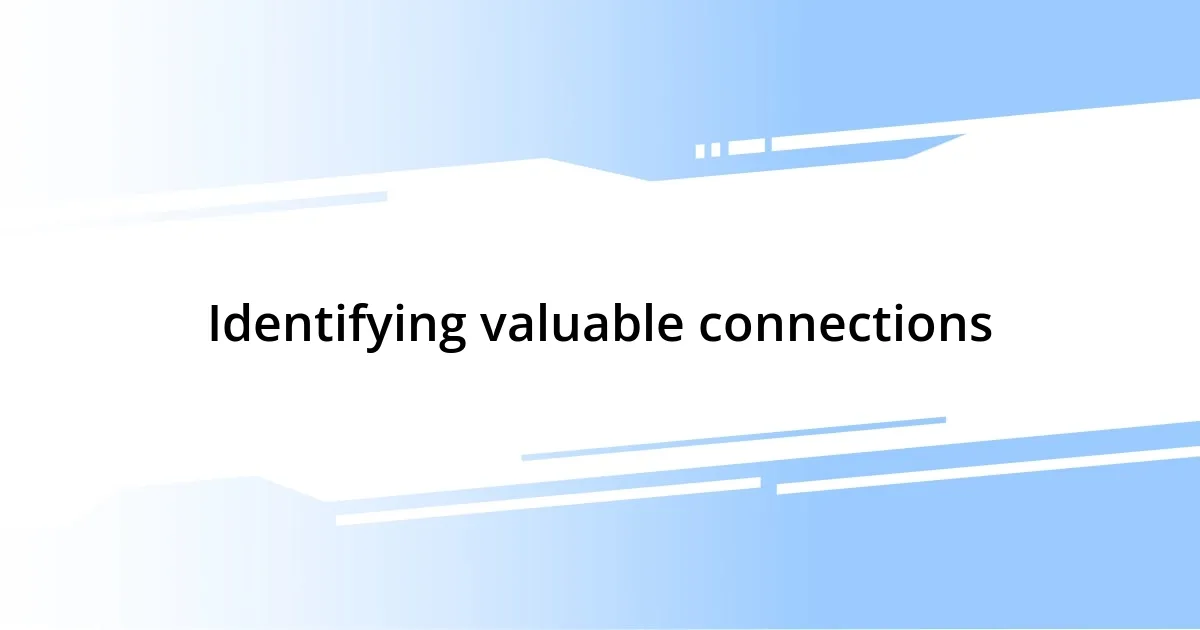
Identifying valuable connections
Identifying valuable connections is about recognizing those who resonate with your goals and values. I recall a moment when I attended a local workshop and struck up a conversation with a participant who shared my passion for sustainability. The energy in our discussion was palpable, and it became clear that we could support each other’s initiatives beyond just exchanging emails. Sometimes, it’s those unexpected connections that yield the most promising opportunities.
When considering who might be a valuable connection, I suggest looking for the following traits:
- Shared Interests: Common passions can create a foundation for collaboration.
- Complementary Skills: Identify those whose strengths complement your own, opening avenues for mutual growth.
- Willingness to Connect: A genuine interest in helping others often indicates a person who values relationships.
- Positive Attitude: Surrounding yourself with upbeat individuals can inspire and uplift your networking experience, creating a more enjoyable atmosphere.
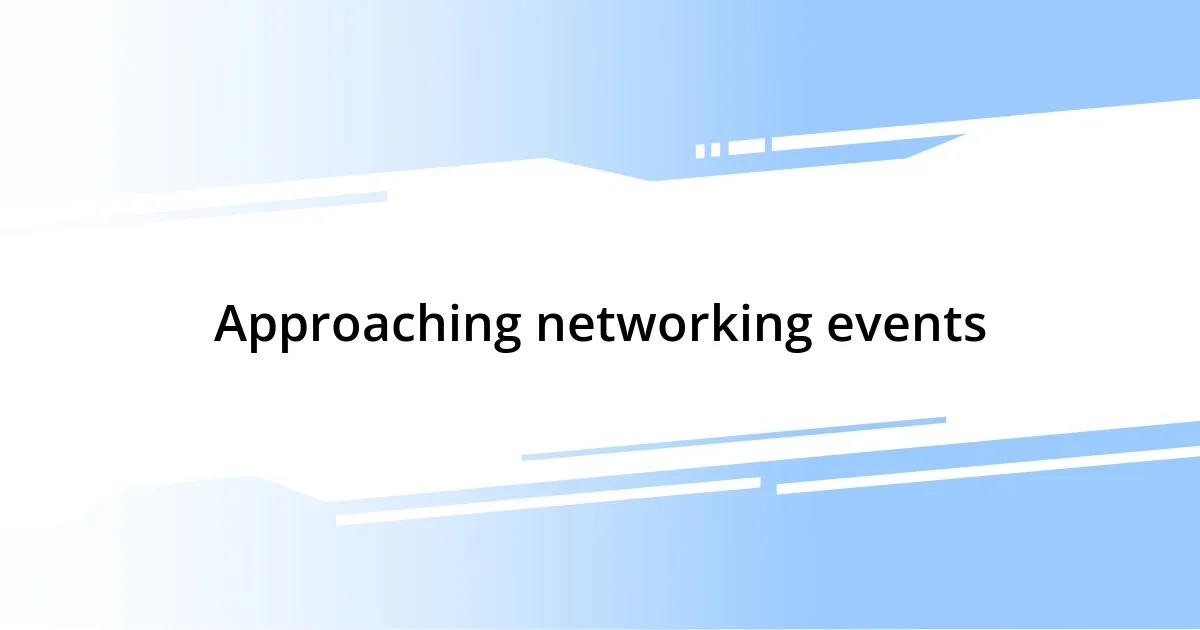
Approaching networking events
Approaching networking events can feel daunting at times, but I’ve found that a simple shift in mindset can make all the difference. When I first entered a room full of strangers, my heart raced. I learned that instead of focusing on myself, I should concentrate on making others feel comfortable. Once I started asking open-ended questions and showing genuine interest, I noticed people began to relax. They often shared insights and stories that made the interaction feel more meaningful, and I wondered: how many connections do we miss when we’re too focused on our own agendas?
Before attending a networking event, I’ve found it helpful to reflect on my intentions. One time, I set a clear goal: to meet three new people and learn something from each. That simple aim transformed my experience. Rather than floundering around, I walked into the event with purpose. Connecting with a fellow attendee who worked in a completely different field opened my eyes to ideas I hadn’t considered. Isn’t it fascinating how a little clarity in your intentions can turn an intimidating situation into a fulfilling one?
Preparation also plays a vital role. I often think about what I might discuss ahead of time. A personal story or a relevant project can serve as a great conversation starter. At a recent event, I shared my passion for a community project, and it sparked an entire dialogue with others who were eager to join. This experience reinforced the idea that being prepared not only boosts your confidence but also creates opportunities for deeper conversations. Have you ever noticed how sharing our personal journeys can ignite a spark in others? It’s those moments that truly make networking rewarding.
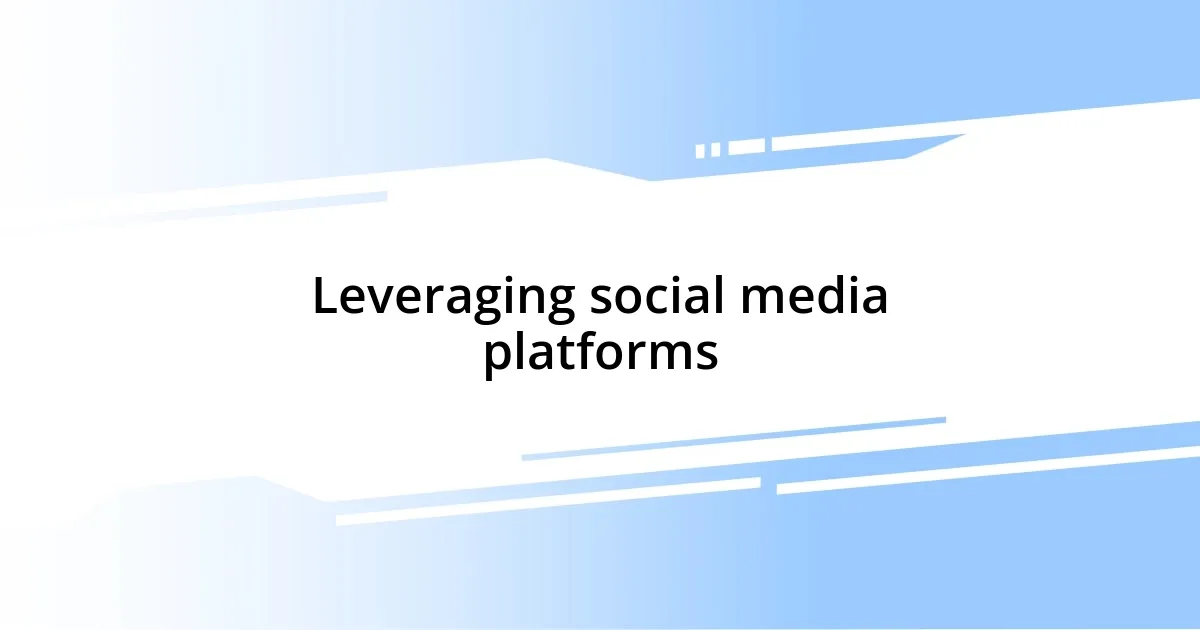
Leveraging social media platforms
Social media platforms are like a treasure chest for networking. I’ve had the pleasure of connecting with people from all over the world through platforms like LinkedIn and Twitter. I remember one night, after a particularly inspiring webinar, I took to Twitter and shared some thoughts about what I learned. To my surprise, a fellow attendee slid into my DMs, sparking a conversation that led to a collaborative project. Isn’t it incredible how a simple tweet can open doors to new opportunities?
Engagement is key when it comes to leveraging these platforms. I’ve made it a habit to not just consume content but to interact with others’ posts—whether it’s leaving insightful comments or sharing relevant articles. Just recently, I commented thoughtfully on a post about industry trends, and the author responded with an invitation to connect. This interaction wasn’t just a digital moment; it blossomed into a conversation that informed my own strategy. Have you ever thought about how a simple comment can elevate your networking game?
In my experience, it’s also essential to be authentic. I’ve seen social media profiles that come off as overly polished or salesy, which doesn’t resonate with me. Instead, I share my genuine journey, including failures and lessons learned. This vulnerability has attracted connections who appreciate my honesty and invite deeper discussions. Isn’t it freeing to share your true self? After all, people gravitate towards authenticity—it creates a sense of community and fosters more meaningful relationships.
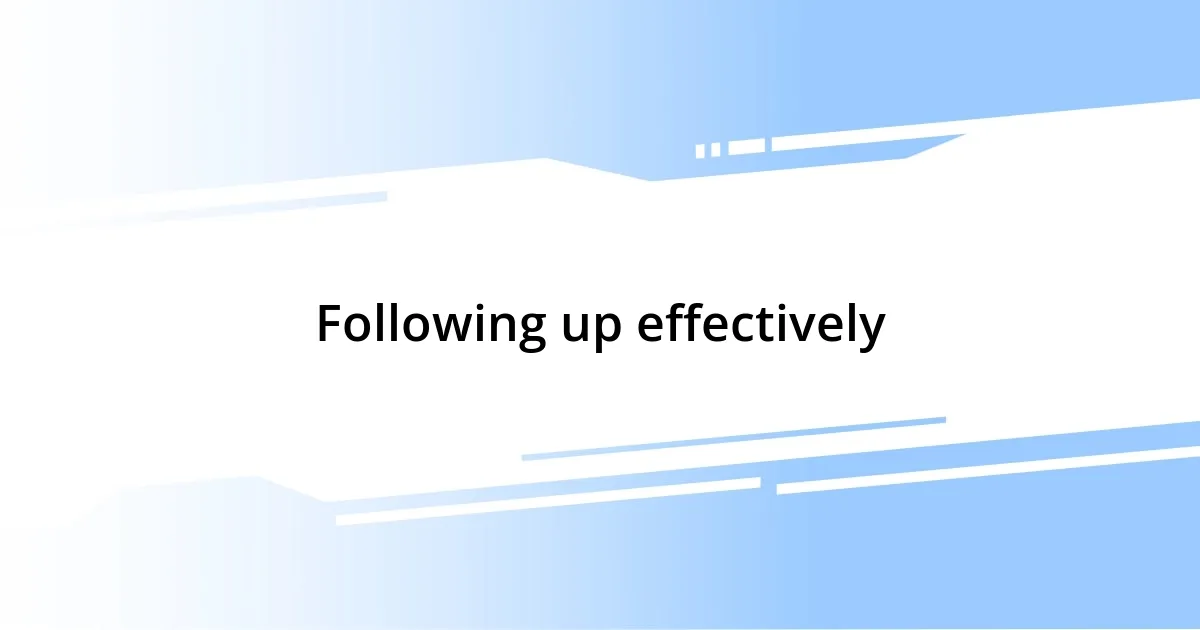
Following up effectively
Following up effectively is where the magic really begins in networking. I remember attending an event where I met someone I really clicked with, but I hesitated to reach out afterward. Eventually, I sent a brief message expressing how much I enjoyed our conversation. To my surprise, they responded enthusiastically, and we scheduled a coffee chat. Have you ever hesitated to follow up? Sometimes, that simple gesture can lead to profound connections.
I’ve learned that timing is everything. After making a new connection, I try to follow up within a few days while that initial spark is still fresh. I often reference something specific from our conversation to keep it personal—like a common interest or a shared laugh. Recently, I followed up with a fellow attendee about a book recommendation they shared. Not only did that ignite our conversation again, but it also laid the groundwork for future collaborations! How do you make your follow-ups stand out?
Adding a personal touch can also work wonders. I once sent a handwritten note to someone I met at a conference, thanking them for their insights. While it may seem old-fashioned, it really made an impact. They responded with a warm email, and our relationship flourished from there. In a world overflowing with digital communication, don’t you think a little personal effort can go a long way? I’ve found that it turns a simple follow-up into a memorable gesture.
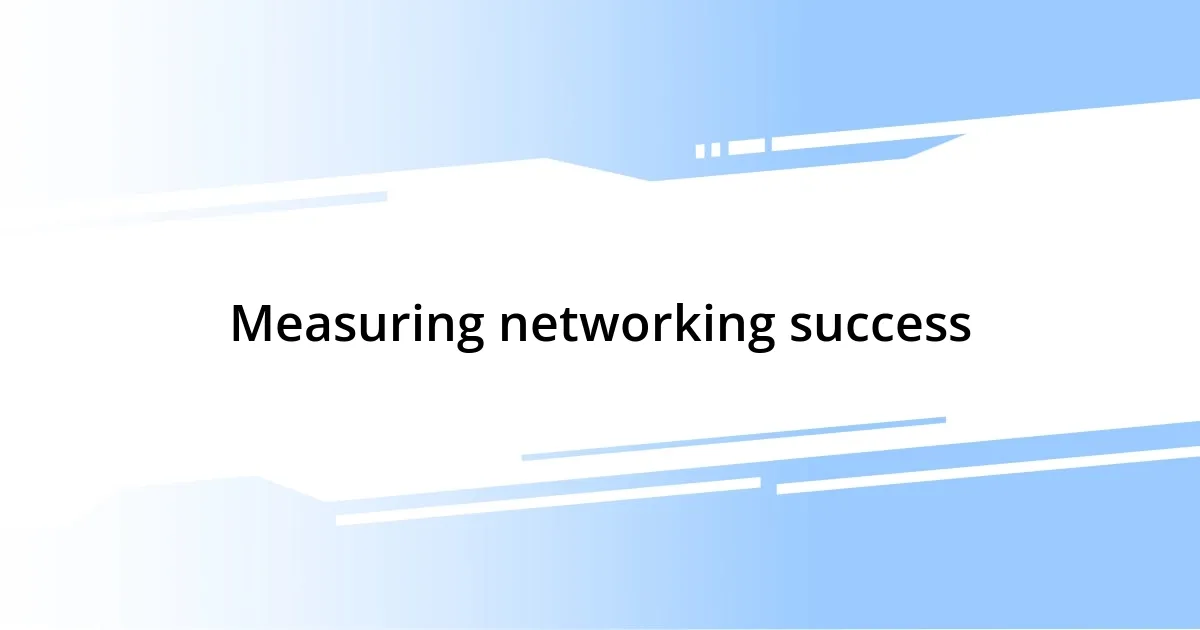
Measuring networking success
Measuring networking success can sometimes feel elusive, but I find it essential to reflect on the tangible outcomes of my connections. For instance, after establishing a new relationship at a networking event, I often note whether our discussions lead to actionable opportunities, like projects or introductions to other professionals. Have you ever tracked the growth of your network not just in numbers, but in real value? That shift in perspective can truly change how you view your connections.
I also pay close attention to the quality of engagements. It’s not just about how many people I’ve met, but how many of those relationships develop into meaningful conversations. Recently, I realized that a few of my connections had become regular sounding boards for ideas, which showed me that I was cultivating a supportive network. Isn’t it refreshing to see your network evolve from mere contacts to trusted allies?
Another important metric for me is mutual growth. I like to assess how I contribute to my network’s success, as well as how they support my endeavors. For example, I once collaborated with a contact on a community project, and their insights enhanced my approach significantly. It’s these moments of shared accomplishment that make my networking efforts feel worthwhile. Have you thought about how collaboration can be a measure of success in your networking journey?

